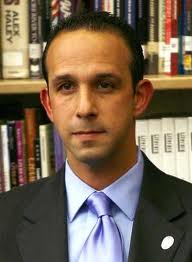In the Doghouse
Colorado Lawmaker Proposes to Let Parents Expose their Kids to Alcohol
 January 16, 2013
January 16, 2013
As the ink dries on marijuana legalization in Colorado, State Senator Greg Brophy (R - Wray) launched into the new legislative session last week with a proposal to allow parents to purchase alcohol for their underage children anywhere where alcohol can legally be consumed. His reasoning? Brophy took his daughter out for her 20th birthday and was miffed that he couldn’t legally buy her a drink. On his Facebook wall, he ranted: "Why on earth would you want to deny responsible parents the chance to expose their own kids to the effects of this product while with their parents?"
Councilmember Englander Ignores Requests to Discuss L.A. Alcohol Ad Ban
 December 14, 2012
December 14, 2012It is regularly an uphill battle trying to reduce alcohol harm in our communities. If we want to make a difference, we have to be in it for the long run. For a year and a half, the Coalition to Ban Alcohol Ads on Public Property in Los Angeles has been organizing to pass a motion to ban alcohol ads on city-owned and controlled property. As research continues to find, youth exposure to alcohol advertising is strongly related to negative public health outcomes: youth start drinking earlier, consume more alcohol, and experience more alcohol-related harm.
Doghouse: A-B InBev Complains about Bud Brand in "Flight"
 November 27, 2012
November 27, 2012
Alcohol corporations want us to believe that their brands are the source of success and attraction; that no person was ever hurt by drinking their brands; that alcoholics only drink moonshine, cane liquor, malt liquor or fortified wine; and that their popular brands are never the culprit of dangerous drinking, deaths, or any other alcohol-related harm.
Anheuser-Busch InBev recently exposed this hypocritical and nonsensical view of the world by complaining about its Budweiser brand appearing in the movie “Flight," in which Denzel Washington plays a high-functioning addict pilot who drinks Budweiser while driving. A-B InBev had the audacity to ask Paramount to blur or remove the Budweiser brand from the film. A-B InBev wants to be the one that decides when its brands can be shown in films, claiming that they can only be shown in "responsible" situations. This is the same A-B InBev that brought advertising and sponsorships to professional sports sixty years ago, and continually pays for celebrity sponsorship and product placement in movies and television.
Paramount stood its ground and has not responded publicly to A-B InBev's bullying, and has not announced whether it will give in the beer producer's demands for video or international release. Paramount and Hollywood need to stick to their guns and show brand names at when depicting drinking. Of course, it would be better if film and television showed much less drinking, and fewer alcohol commercials. Barring that, they should not be pressured by the industry to avoid showing brand names of the big beer duopoly or any other kind of swill.
A-B InBev apparently doesn't want an artistic or accurate portrayal of the real world, where people regularly consume their brand-name drug. Real people don’t drink bottles with a made-up or smudged out logo. If an American is drinking a beer product in the U.S., chances are that it's made by the big beer duopoly of A-B InBev and MillerCoors. We have a loosely-followed “equal-time rule” for elections; one that states major candidates for office should be given equal news time on television. How about an “equal-time rule” that requires showing alcohol-related harm – death, violence, family fights, rape, cancer, and others – proportionately by brand name?
A conservative estimate for alcohol-related deaths in the U.S. is 79,000 each year; alcohol-related harm cost the U.S. $223 billion in 2006 (Centers for Disease Control and Prevention). A-B InBev sells about 48% of the beer in the U.S., and beer is 49% of alcohol by sales and therefore 23% of alcohol sales in the US. That 23% market share can be applied to the harm. Isn’t it reasonable to estimate that there are 18,000 “Anheuser-Busch-related” deaths in the U.S. each year, and A-B InBev costs government and the public $51 billion annually? If A-B InBev has a problem with my estimates, it can offer its own estimate of which alcohol brands are causing the harm and death, and by what percentage. The Budweiser tag line “Enjoy Responsibly” doesn’t sound joyful to the loved ones of 18,000 deceased each year.
Isn’t it surprising how radical it seems to name the corporations and brands that cause harm? The alcohol industry built a firewall around itself legally and ideologically by claiming its support for "responsible drinking." It blames individual consumers for alcoholism (and all other harm), and never the environment of alcohol consumption that it creates for its brands. Big Alcohol keeps U.S. alcohol taxes low, at rates that are a fraction of some European taxes; advertises whenever and wherever it wants; creates products that are designed to be attractive to youth; and blames bar tenders, and parents, and youth, and drunk drivers. Big Beer never shoulders any of the blame itself.
Names are important. Budweiser is not a Missouri-based company. It is incorporated in Delaware and is a subsidiary of A-B InBev, headquartered in Brussels. It is controlled by Brazilian management, headed up by Carlos Brito, CEO. Why does that matter? It's important to understand that this international company wants to place--and does place-- its brand name in sports, film, television and the internet throughout the world. While it pays its billions of dollars in acquisition debt, it wants to remain blameless in death, preventable disease, alcohol addiction, and underage drinking. Carlos Brito, you and your Budweiser brand have responsibility for harm, and should not control where your product is shown in film or television scenes where harmful drinking takes place.
More Articles ...
Help us hold Big Alcohol accountable for the harm its products cause.
| GET ACTION ALERTS AND eNEWS |
STAY CONNECTED    |
CONTACT US 24 Belvedere St. San Rafael, CA 94901 415-456-5692 |
SUPPORT US Terms of Service & Privacy Policy |


